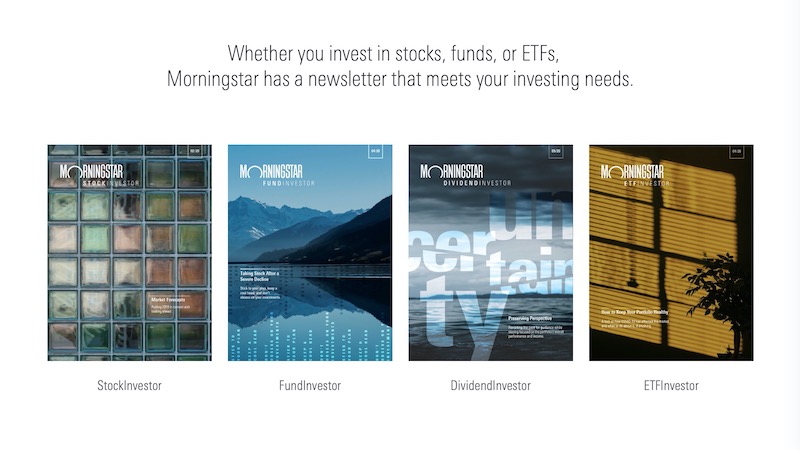
Investment newsletters can be a great way for you to get started with your investing journey. These newsletters will help you save time and money, as well as make you a better investor. These newsletters are a great way to learn about investing. But be cautious. These are the warning signs to look out for.
Experiential editors publish most investment newsletters. They are available online and in print. They're also often free. Some can cost thousands of dollars per year. It is worth paying extra to get the best financial advice.
Selecting a newsletter requires that you consider several factors. Do you prefer a general market discussion, or a portfolio of models? If so, is there a free trial? Do you plan on using the newsletter on an ongoing basis? Are you interested in small cap stocks or value stocks?

A well-designed newsletter will provide you with the correct information and in an easy-to read format. Ideally, you'll be able to see a bar chart that displays the relative returns of stocks over time. Some newsletters are also packed with statistics and facts.
Be skeptical of newsletters that claim to have the "magic formula" or offer a "priceless tip." These claims are usually false or misleading. Be wary of newsletters that advertise stocks without disclosing compensation.
Likewise, you should be aware of a newsletter's practices when it comes to making trades. A model portfolio newsletter should include detailed information on how they trade. It should, for example, include the date and amount of trades, the purchase price, and the time it was entered.
Another type of newsletter for investors is one that provides detailed analysis of a company. This is especially helpful if you're considering purchasing shares in that company. One example of a newsletter that specializes in this is IQ Trends.

The "list of Ideas" type of newsletter is the last. Typically, these are a curated list of stocks. Sometimes, they even rate or recommend them. Many list of ideas newsletters publish a new stock every month. Some offer "buy Below" prices for select positions.
Some investors prefer to manage their investments themselves, but others prefer to receive the advice and personalized attention of a newsletter. Some investing newsletters charge thousands of dollars a year. Some are free. You should still test out several newsletters before signing up. Try out different newsletters and compare their recommendations to make sure you get what you pay for.
Investing newsletters can be a fun and exciting way to make money. It's easy to keep up with the latest developments in the stock markets and get informed about innovative investing strategies by reading a newsletter.
FAQ
What is personal finance?
Personal finance involves managing your money to meet your goals at work or home. It is about understanding your finances, knowing your budget, and balancing your desires against your needs.
If you master these skills, you can be financially independent. This means you are no longer dependent on anyone to take care of you. You won't have to worry about paying rent, utilities or other bills each month.
You can't only learn how to manage money, it will help you achieve your goals. It makes you happier overall. If you are happy with your finances, you will be less stressed and more likely to get promoted quickly.
Who cares about personal finance anyway? Everyone does! The most searched topic on the Internet is personal finance. According to Google Trends, searches for "personal finance" increased by 1,600% between 2004 and 2014.
People use their smartphones today to manage their finances, compare prices and build wealth. You can read blogs such as this one, view videos on YouTube about personal finances, and listen to podcasts that discuss investing.
Bankrate.com says that Americans spend on the average of four hours per day watching TV and listening to music. They also spend time surfing the Web, reading books, or talking with their friends. Only two hours are left each day to do the rest of what is important.
Personal finance is something you can master.
How much debt can you take on?
It is important to remember that too much money can be dangerous. If you spend more than you earn, you'll eventually run out of cash because it takes time for savings to grow. So when you find yourself running low on funds, make sure you cut back on spending.
But how much do you consider too much? There's no right or wrong number, but it is recommended that you live within 10% of your income. Even after years of saving, this will ensure you won't go broke.
This means that even if you make $10,000 per year, you should not spend more then $1,000 each month. You shouldn't spend more that $2,000 monthly if your income is $20,000 If you earn $50,000, you should not spend more than $5,000 per calendar month.
It is important to get rid of debts as soon as possible. This applies to student loans, credit card bills, and car payments. Once these are paid off, you'll still have some money left to save.
It is best to consider whether or not you wish to invest any excess income. If you decide to put your money toward stocks or bonds, you could lose money if the stock market falls. However, if the money is put into savings accounts, it will compound over time.
For example, let's say you set aside $100 weekly for savings. That would amount to $500 over five years. In six years you'd have $1000 saved. You would have $3,000 in your bank account within eight years. It would take you close to $13,000 to save by the time that you reach ten.
In fifteen years you will have $40,000 saved in your savings. That's quite impressive. However, if you had invested that same amount in the stock market during the same period, you'd have earned interest on your money along the way. You'd have more than $57,000 instead of $40,000
That's why it's important to learn how to manage your finances wisely. Otherwise, you might wind up with far more money than you planned.
Which passive income is easiest?
There are many ways to make money online. Some of these take more time and effort that you might realize. How can you make extra cash easily?
The answer is to find something you love, whether blogging, writing, designing, selling, marketing, etc. Find a way to monetize this passion.
For example, let's say you enjoy creating blog posts. Create a blog to share useful information on niche-related topics. When readers click on those links, sign them up to your email list or follow you on social networks.
This is called affiliate marketing, and there are plenty of resources to help you get started. Here are 101 affiliate marketing tips and resources.
As another source of passive income, you might also consider starting your own blog. You'll need to choose a topic that you are passionate about teaching. After you've created your website, you can start offering ebooks and courses to make money.
Although there are many ways to make money online you can choose the easiest. It is important to focus on creating websites and blogs that provide valuable information if your goal is to make money online.
After you have built your website, make sure to promote it on social media platforms like Facebook, Twitter and LinkedIn. This is known content marketing.
What side hustles are the most profitable?
Side hustle is an industry term that refers to any additional income streams that supplement your main source.
Side hustles are important because they make it possible to earn extra money for fun activities as well as bills.
Side hustles can also be a great way to save money for retirement, have more time flexibility, or increase your earning potential.
There are two types of side hustles: passive and active. Online businesses like e-commerce, blogging, and freelance work are all passive side hustles. Active side hustles include jobs such as dog walking, tutoring, and selling items on eBay.
Side hustles that are right for you fit in your daily life. If you love working out, consider starting a fitness business. If you enjoy spending time outdoors, consider becoming a freelance landscaper.
Side hustles can be found everywhere. Side hustles can be found anywhere.
One example is to open your own graphic design studio, if graphic design experience is something you have. Perhaps you're an experienced writer so why not go ghostwriting?
You should do extensive research and planning before you begin any side hustle. When the opportunity presents itself, be prepared to jump in and seize it.
Side hustles can't be just about making a living. Side hustles are about creating wealth and freedom.
There are so many ways to make money these days, it's hard to not start one.
How to make passive income?
To make consistent earnings from one source you must first understand why people purchase what they do.
Understanding their needs and wants is key. This requires you to be able connect with people and make sales to them.
Next, you need to know how to convert leads to sales. To keep clients happy, you must be proficient in customer service.
You may not realize this, but every product or service has a buyer. You can even design your entire business around that buyer if you know what they are.
A lot of work is required to become a millionaire. It takes even more work to become a billionaire. Why? Because to become a millionaire, you first have to become a thousandaire.
Then you must become a millionaire. Finally, you can become a multi-billionaire. You can also become a billionaire.
How do you become a billionaire. Well, it starts with being a thousandaire. All you need to do to achieve this is to start making money.
Before you can start making money, however, you must get started. Let's look at how to get going.
Why is personal finance so important?
Personal financial management is an essential skill for anyone who wants to succeed. We live in a world with tight finances and must make tough decisions about how we spend our hard earned cash.
Why should we save money when there are better things? Is it not better to use our time or energy on something else?
Yes and no. Yes, as most people feel guilty about saving their money. It's not true, as more money means more opportunities to invest.
You'll always be able justify spending your money wisely if you keep your eyes on the bigger picture.
Financial success requires you to manage your emotions. You won't be able to see the positive aspects of your situation and will have no support from others.
Also, you may have unrealistic expectations about the amount of money that you will eventually accumulate. This is because your financial management skills are not up to par.
These skills will prepare you for the next step: budgeting.
Budgeting means putting aside a portion every month for future expenses. Planning will allow you to avoid buying unnecessary items and provide sufficient funds to pay your bills.
You now have the knowledge to efficiently allocate your resources and can start to see a brighter financial future.
Statistics
- 4 in 5 Americans (80%) say they put off financial decisions, and 35% of those delaying those decisions say it's because they feel overwhelmed at the thought of them. (nerdwallet.com)
- U.S. stocks could rally another 25% now that Fed no longer has ‘back against the wall' in inflation fight (marketwatch.com)
- While 39% of Americans say they feel anxious when making financial decisions, according to the survey, 30% feel confident and 17% excited, suggesting it is possible to feel good when navigating your finances. (nerdwallet.com)
- These websites say they will pay you up to 92% of the card's value. (nerdwallet.com)
- As mortgage rates dip below 7%, ‘millennials should jump at a 6% mortgage like bears grabbing for honey' New homeowners and renters bear the brunt of October inflation — they're cutting back on eating out, entertainment and vacations to beat rising costs (marketwatch.com)
External Links
How To
Passive Income Ideas To Improve Cash Flow
There are many online ways to make extra money without any hard work. Instead, there are ways for you to make passive income from home.
Automating your business could be a benefit to an already existing company. If you are considering starting your own business, automating parts can help you save money and increase productivity.
The more automated your company becomes, the more efficient you will see it become. This allows you to spend more time growing your business than managing it.
Outsourcing tasks can be a great way to automate them. Outsourcing allows you to focus on what matters most when running your business. By outsourcing a task, you are effectively delegating it to someone else.
This means that you can focus on the important aspects of your business while allowing someone else to manage the details. Outsourcing can make it easier to grow your company because you won’t have to worry too much about the small things.
It is possible to make your hobby a side hustle. A side hustle is another option to generate additional income.
If you like writing, why not create articles? You have many options for publishing your articles. These websites offer a way to make extra money by publishing articles.
It is possible to create videos. Many platforms now enable you to upload videos directly to YouTube or Vimeo. You'll receive traffic to your website and social media pages when you post these videos.
Investing in stocks and shares is another way to make money. Investing in stocks and shares is similar to investing in real estate. Instead of renting, you get paid dividends.
When you buy shares, they are given to you as part of your dividend. The size of the dividend you receive will depend on how many stocks you purchase.
You can reinvest your profits in buying more shares if you decide to sell your shares. This will ensure that you continue to receive dividends.